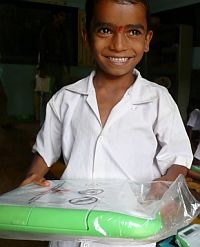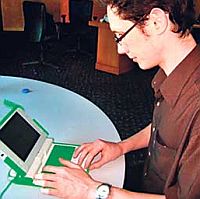Late last year, we all felt the warm and fuzzy feelings of accomplishment when OLPC launched its One Laptop Per Khairat Child in India, countering the previous "pedagogically suspect" criticism by Indian education ministers.
This year, OLPC is expanding its presence in South Asia with an expansion in India itself and the promise of One Laptop Per Sri Lankan Child in two new initiatives. First, the Economic Times of India reports that through One Laptop Per Child:
The project, which aims to provide digitally-enabled education through the use of low-cost laptops to children in developing countries, will see its first deployment in Maharashtra.But that is just the start of an Indian revolution in childhood education. The government of India is embracing a computer saturation model that is exactly one half the dream of 1:1 computing, according to The Telegraph:About 500 XO laptops, as the laptops are called, would arrive in February for deployment in various schools in the state. The laptops have been localised and come with the keyboard in Devanagari.
“Our target is to have one computer - a PC - for every two school-going children by the end of the eleventh Five Year Plan. We will start with government schools, which need the assistance the most,” a senior official at the ministry of human resource development told The Telegraph.While the Indian government is focused on half-solutions, its much smaller rival, Sri Lanka, is thinking much bigger.A National Policy on ICT in Education is being drafted, which for the first time will provide a synchronised plan of action in making computers - and the Internet, in particular - available to all children. The policy will focus on getting private players to build school computer labs which the companies will own and offer as a paid service, before transferring ownership to the school or the government.
According to the The Sunday Times FT interview of Matt Keller, Director OLPC Europe, Middle East and Asia, the World Bank has stepped into fund a pilot project to introduce laptops as an educational tool in nine provinces in the island through a OLPC Lanka Foundation.
This would be shocking news to me, having heard that the World Bank is adamantly opposed to funding OLPC activity before there are objective results proving that laptop purchases are more effective than better teacher training.
Regardless, I do salute Matt's optimism that OLPC Lanka Foundation would overcome the logistical challenges of importing XO laptops duty-free. From my experiences with Sri Lankan customs police, that alone would be a stunning success worthy of a One Duty-Free Laptop Per Child award.




Seymour Papert, if my memory serves, established in /Mindstorms/ that the ideal ratio was three kids to a machine, to the point that if your lab has extra machines, those should be turned off. (might have been 2 to one, it's been 20 years since I read that book - but definitely not one to one). I was therefore a bit surprised when OLPC says it follows Papert, and at the same time has as its main statement (in the name itself) that the ratio should be 1:1. Did Papert change his mind? Has research :-) proved him wrong? He had good constructionist theory and MIT AI Lab research to back his assertions in those days.
"Seymour Papert, if my memory serves, established in /Mindstorms/ that the ideal ratio was three kids to a machine, to the point that if your lab has extra machines, those should be turned off."
Well, not in my copy :) He emphasized the role of collaboration in students' learning process and recommended 'pairing' of students per computer (no means of PCs 'networking' at the time). Of course, this is very much in line with the way OLPC XOs are designed - collaboration is the main design principle behind Sugar GUI and its Activities and, given the state of today's technology (mesh networking), it enables true collaboration, involving their laptops, of even larger number of students.
I hope that India and Sri Lanka do not waste their limited resources on proven flops like the XO laptop.
When I was in school in the 1960's and early 70's, our mathematics work was done by pencil (later pens) and paper. Long division and multiplication, addition and subtraction were all long torturous affairs with sheets of paper covered with calculations only to be tossed in the garbage at some later date.
I remember when calculators first appeared. We weren't allowed to use them in school because it would affect our ability to learn 'pencil and paper' maths. Even as late as the mid 1970's when I sat for my final exams we had to show all our calculations on the paper. Calculators were still forbidden.
Theara wrote:
"I hope that India and Sri Lanka do not waste their limited resources on proven flops like the XO laptop."
It amazes me how people are still narrow minded. I guess with new concepts in education it is easier to reject than to embrace.
@Robert Arrowsmith:
"I remember when calculators first appeared. We weren't allowed to use them in school because it would affect our ability to learn 'pencil and paper' maths. Even as late as the mid 1970's when I sat for my final exams we had to show all our calculations on the paper. Calculators were still forbidden."
I have learned how to use a slide-rule in school. Were I live, calculators were forbidden too at the time. I have never, ever been able to practise my skills on a slide rule. Outside school, everybody used calculators.
For those who don't remember the venerable slide rule:
http://en.wikipedia.org/wiki/Slide_rule
Today they use graphical calculators in school that can solve matrix equations. And why shouldn't they. Doing matrix calculations by hand is useless. If the matrix is big enough to matter, you won't be able to solve it by hand anyway.
(yes, I know you can solve it, just take a few weeks off)
Theara wrote:
"I hope that India and Sri Lanka do not waste their limited resources on proven flops like the XO laptop."
Indeed, another one that wants to stick to proven technologies, like slide rules.
Winter
Has anyone noticed the irony of the Amazon.com advertisements for laptops at the bottom of this page?! What is wrong with this picture?
I live in Sri Lanka. We are not rich people we just try to stand.........
this is a good work. we thank it. if you can please help us to.
My Address is- No856,Medawelena,debarawewa,Tissamaharama.Srilanka.
My phone num is- +94472239114